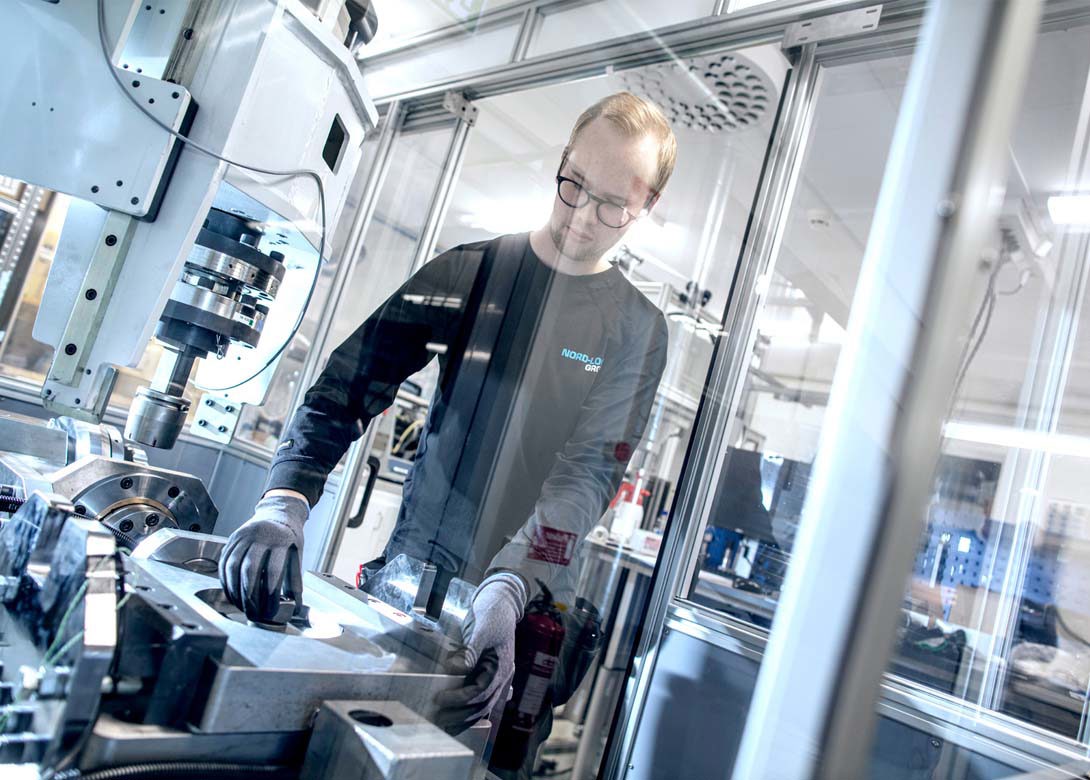
Through its technical centres, in Europe, North America and Asia, Nord-Lock Group is able to optimise the design of customers’ bolted connections.
Nord-Lock, who developed the original wedge-locking technology in 1982, have been rigorously testing its washers ever since. In 1983, Nord-Lock added the Junker test, a DIN standard -DIN 65151 test that it could use to prove the reliability of its wedge-locking washers compared with alternative locking methods when exposed to extreme vibrations.
Today, Nord-Lock Group conducts hundreds of Junkers tests each year, for customers in all major industries worldwide. As a global leader in secure bolting solutions, the company’s in-house engineering expertise and range of performance/application testing has grown far beyond just the Junker test.
Nord-Lock Group operates six technical centres across the world, and each is equipped to perform customer-specific testing for a range of bolting methods, from the smallest Nord-Lock wedge-locking washers to large diameter Superbolt mechanical tensioners or Boltight hydraulic tensioning.
Tests and analyses are usually conducted in the technical centres, where the customer can be present, but Nord-Lock Group engineers will also travel to customer locations for more challenging or larger applications, both to conduct the tests and to provide product training.
The EMEA technical centre in France
Cyril Cadoux, technical Mmanager EMEA at Nord-Lock Group, leads a technical team in Lyon, France, one of several Nord-Lock Group technical centres across the world that support customers in the region with technical support and bolt testing.
With decades of accumulated knowledge and experience within the team, plus an archive of well documented tests, some technical answers can be provided very quickly. “If we are asked to make some torque value recommendations, for example, then we can provide a fast theoretical calculation. However, reality can of course introduce some parameters that cause deviations, so most of the time we recommend customers to perform a torque-tensile test with us to fully assess the assembly’s behaviour. This way we can give the customer very specific feedback on their installations,” says Cyril.
The torque-tensile test
Nord-Lock Group uses a torque-tensile bench to verify theoretical data and assumptions by putting parts to the test. The calibrated machine simultaneously records torque, preload and angle of rotation. The test gives a full understanding of all influential factors for the torque-tensile or torque-to-angle preload relationship. From the measured values, coefficients of friction of the fasteners are characterised under the turned part and in the threads.
As preload conditions the functionality and durability of a bolted connection, its highly important to verify and characterise the torque-tensile conditions. Controlling the coefficients of friction allows you to specify the adequate torque setting, thereby achieving the necessary preload and fitting the required preload window specified by the designer.
Fastener testing on-site or in laboratories
Most of the time, Cyril’s team replicate the customer’s environment in the Nord-Lock technical centre. “We ask them to provide the materials, at least the bolts they’re using and the assembly method, for instance if they’re using it in a tapped hole. By replicating the environment and tightening method, Nord-Lock Group’s testing will deviate as little as possible from the customer’s reality,” explains Cyril.
In some cases, Nord-Lock Group’s technical team will also travel. “Just recently we had a shipping customer in the Netherlands who was working with large flanges. In this case, we could conduct the theoretical work as usual in our lab, but the project reached a point where a completely unique parameter meant that we needed to conduct the testing on-site. We needed proof that our theory worked in practice,” mentions Cyril.
As it turns out, the theory had perhaps been a little conservative in terms of what the Nord-Lock Group product was capable of. “Essentially, we were dealing with a painted coating layer that we hadn’t worked with before, but to our delight the testing proved that the paint was creeping into the material very well and our solution could achieve the adequate grip to secure the bolted connection, with a capacity much higher than we had thought. The customer was very happy that it performed much, much better than we had anticipated in theory. Our aim is to be the trusted partner for our customers when it comes to bolted connections. Being able to offer these services, quickly and worldwide, is a big part of how we build those relationships.”
Cyril adds: “Nord-Lock’s skilled and innovative engineers are always ready to help, review and discuss customers’ applications in order to optimise the design of their bolted connections. Our Technical Centers are equipped with advanced systems and many companies take advantage of the wide array of services we offer.”
www.nord-lock.com
Biog
Will joined Fastener + Fixing Magazine in 2007 and over the last 15 years has experienced every facet of the fastener sector - interviewing key figures within the industry and visiting leading companies and exhibitions around the globe.
Will manages the content strategy across all platforms and is the guardian for the high editorial standards that the Magazine is renowned.






